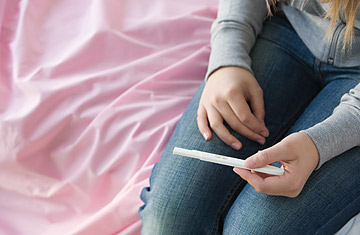
(8 of 14)
There is for many young girls another, less tangible factor in the sequence of events leading to parenthood: a sense of fatalism, passivity and, in some cases, even a certain pleasure at the prospect of motherhood. Such attitudes are especially prevalent among the poor. Take Zuleyma, 16, of Los Angeles, who gave birth last May: "I thought I might want to have a baby," she says. "I was thinking more in the future, but things happen." Or Derdra Jones of Chicago, who gave birth at 15: "Part of me wanted to get pregnant," she confesses. "I liked the boy a lot, and he used to say he wanted a baby." Or Marquel, 17, of Hawthorne, Calif.: "I had birth control pills in my drawer. I just didn't take them," she says. "My life was getting boring. I wanted a baby."
For young girls trapped in poverty, life offers few opportunities apart from getting pregnant. High school may seem pointless. Even graduation is little guarantee of a job. Their lives are circumscribed in every sense. Says Social Worker Lisa Rost, who counsels such youngsters at Project Hope in Chicago: "Some of these kids have never seen Lake Michigan." Pregnancy becomes one of the few accessible means of fulfillment. "Nobody gets more attention than a little girl who's pregnant," observes Bishop Earl Paulk of Chapel Hill Harvester Church, a Protestant church in Atlanta that sponsors a program for pregnant teens. "It feels good to be the center of things."
Youngsters who get pregnant often have a history of feeling deprived and neglected. Many have been abused or raped. "Their getting pregnant has nothing to do with sex," observes Pat Berg, director of a Chicago program for homeless youth. "It's attempting in a perverse sense to get some security and nurturing needs met . . . It's like when kids get puppies." Finally, there is little social pressure to persuade them to postpone childbearing, notes Joy Dryfoos, who has conducted research for the Rockefeller Foundation. Middle-class girls tend not to have babies, she says, "because Mother would kill them if they did." For the lower socioeconomic groups, she says, "it's the big shoulder shrug. They don't get abortions. They don't use contraception. It's just not that important; they don't have a sense of the future."
No wonder teenage pregnancies have reached epidemic proportions in some ghetto areas. According to Guttmacher statistics, black American teenagers have the highest fertility rate of any teenage population group in the entire world. (Israeli Arabs come in a distant second.) One in four black babies in the U.S. is born to a teen mother, most of them unwed. "In the black community, the phenomenon of teen marriage is almost gone," observes Mark Testa of NORC. "Eventually these girls get married, but it might be years later and not to the father of the child." Young black women under age 24 are facing "a shrinking pool of marriageable--that is, economically stable--young men," explains Sociologist William Julius Wilson of the University of Chicago, who coauthored a 1985 study titled Poverty and Family Structure. The reasons he cites for the dearth of eligible candidates: unemployment, incarceration and an appalling rate of murder, the leading cause of death of black males age 15 to 44.
